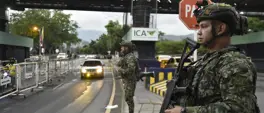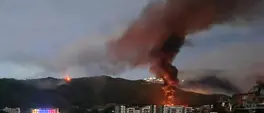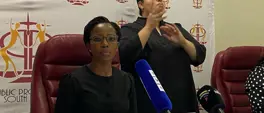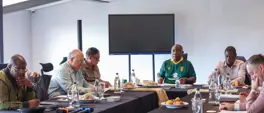MALAIKA MAHLATSI: MK Party is correct – more transparency is needed on the water crisis in Hammanskraal
Malaika Mahlatsi
28 December 2024 | 11:05Government communications must do better in engaging with the Hammanskraal community and assure them that concrete solutions are underway. After two decades of dealing with water insecurity, they deserve no less, writes Malaika Mahlatsi.
A few months ago, I graduated with a Master of Science degree in Water Resource Science from the Institute for Water Research at Rhodes University.
My dissertation focused on the equity dimensions and governance drivers of water insecurity in Hammanskraal, a township north of Tshwane.
I was able to analyse the barometer of water challenges in Hammanskraal, tracing it to the pre-democracy era when, under the Bophuthatswana administration, the township, like all others in South Africa, was battered by the policy of separate and uneven development that led to limited investment in the water infrastructure.
This under-development of township infrastructure contributed to the disenfranchisements of Black people residing in them and has continued under the democratic order.
In the post-apartheid dispensation, Hammanskraal has continued to face water challenges mainly resulting from poor water governance and maladministration on the part of successive administrations in the City of Tshwane metropolitan municipality, as well as the national government.
In September 2023, President Cyril Ramaphosa signed Proclamation R 138 of 2023 authorising the Special Investigating Unit (SIU) to investigate allegations of maladministration and corruption in the municipality, including a probe into the procurement and contracting for the construction of Phase 1 upgrades and refurbishment at the Rooiwal Wastewater Treatment Works, which treats Hammanskraal’s sewage.
This was as a result of the municipality awarding a R295 million tender to a joint venture that includes corruption-accused businessman, Edwin Sodi’s company, Blackhead Consulting. Procument processes of the tender were flouted and included irregularities.
Furthermore, the city was forced to cancel the contract in 2022, with just over 65% of the work being done. Several of its employees underwent disciplinary hearings, and the Bid Evaluation Committee (BEC) that had awarded the tender was dissolved and replaced by a new one.
Having conducted my research at a time when Hammanskraal was the epicentre of a devastating cholera outbreak that claimed numerous lives in 2023, I gained an in-depth understanding of the extent of the water insecurity challenges confronting the township and the administrative capital in general.
Thus, it came as a surprise to me when, just weeks after I concluded my research, President Cyril Ramaphosa announced that a new water system, managed by Magalies Water, one of the nine water boards in the country, would be operational within six months and that the people of Hammanskraal would receive clean drinking water by the end of 2023.
Several politicians, including Fikile Mbalula, the Secretary-General of the African National Congress (ANC), also made the same claims.
I knew, as did other water scientists and researchers, that this timeline was not reasonable. And so, I chalked it up to the upcoming general election, especially since one of the findings of my research was that water had become a serious issue to the Hammanskraal electorate.
President Ramaphosa would later admit that the repairing and upgrading of Rooiwal would require R4 billion, and that resolving the water crisis in Hammanskraal would take some time. Thus, it came as no surprise when the timeline was moved to September 2024, and then to October of the same year.
The recently elected executive mayor of Tshwane, Dr Nasiphi Moya, then indicated that the people of Hammanskraal would have clean drinking water by the end of December.
On the 24th of December 2024, the municipality communicated that the city had completed testing water in the reticulation network, but that minor turbidity was present.
Turbidity is a measure of water clarity – high turbidity makes the water appear muddy or cloudy. This means that the water is not yet safe to drink.
A day after this announcement, the deputy minister of water and sanitation, David Mahlobo, stated in an interview with eNCA that there had been delays in the provision of clean water, owing to a myriad of challenges, including the extent of sedimentation, drawing a link between some of the delay with load shedding challenges.
As things stand, the timeline for all residents of Hammanskraal to have access to clean drinking water is June 2025. This will be in phases, with areas closer to the distribution storage point expected to receive their supply first.
The uMkhonto weSizwe Party (MKP) has taken up the issue, announcing that it intends to write to Parliament’s portfolio committee on water and sanitation, the Gauteng Provincial Legislature, and the City of Tshwane council to demand accountability for "the lies perpetuated against the people of Hammanskraal".
The MKP argues that water is a constitutional right – an argument that was first made by the South African Human Rights Commission (SAHRC) in a 2019 report revealing that the pollution of water resources in Hammanskraal was the result of failure by the City of Tshwane to maintain wastewater treatment works in the township, thus failing to fulfil its constitutional obligations.
In a 2021 report, the SAHRC stated in no uncertain terms that the lack of clean water in Hammanskraal was a violation of human rights. And there is no question that it is.
For this reason, the government needs to be more transparent and honest in its communication about the progress of the resolution of the water crisis in Hammanskraal.
Since the cholera outbreak, the government has been making short-term and medium-term interventions to resolve the crisis. This includes the construction of a package plant to supply 50 megalitres per day in Hammanskraal.
The first of four modules of this plant, providing about 12.5 megalitres per day, has been completed. And while this is good news, the reality is that it is not a sustainable solution in the absence of the repairing and refurbishment of Rooiwal, as well as other wastewater treatments in the country, more than 70% of which have varying degrees of dysfunction.
Furthermore, there is poor communication on the part of both the municipal and national government, to the people of Hammanskraal and South Africa broadly. Government communications must do better in engaging with the Hammanskraal community and not rely solely on traditional methods of information distribution such as press statements, as these are not accessible to many people, both in terms of language and platforms where they are published.
The jargon that is used in this communication, such as speaking to the media about water turbidity as was done by the City of Tshwane spokesperson a few days ago, is completely inaccessible to the average person in a Hammanskraal where education levels are low, and English is not the language of communication.
This speaks to a failure in procedural and participatory equity, without which water security is not possible.
Furthermore, consistent updates and details about the progress with the package plant are needed so that the community can be assured that concrete solutions are underway.
After two decades of dealing with water insecurity, the people of Hammanskraal deserve no less.
Malaika Mahlatsi is a geographer and researcher at the Institute for Pan African Thought and Conversation. She is a PhD in Geography candidate at the University of Bayreuth in Germany.
Get the whole picture 💡
Take a look at the topic timeline for all related articles.















